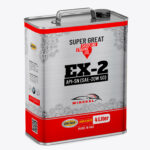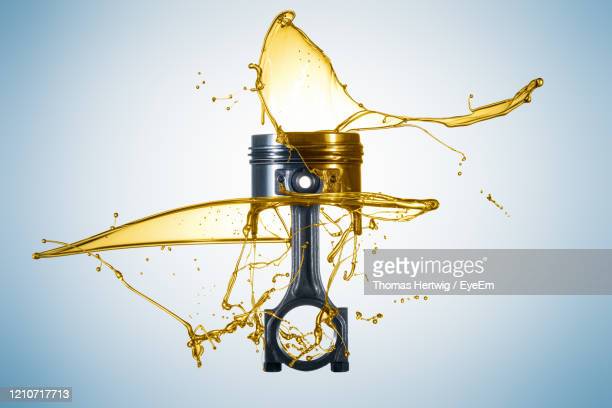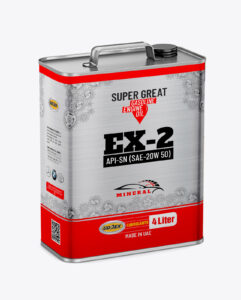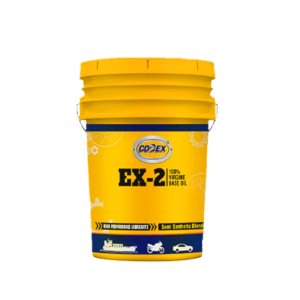Lubricant Oil Supplier in Bangladesh: Codex Oil International
Lubricant Oil Supplier in Bangladesh: Codex Oil International

Engine oil, often referred to simply as “oil,” is a lubricating substance that is essential for the proper functioning and longevity of internal combustion engines. It is primarily used in automobiles, trucks, motorcycles, and various industrial machines that rely on internal combustion engines for power generation.
Here are the key functions and purposes of engine oil:
Lubrication: Engine oil serves as a lubricant, reducing friction between moving parts within the engine. It creates a protective film between metal surfaces, preventing direct contact and minimizing wear and tear. Proper lubrication is vital to reduce engine component wear and extend engine life.
Heat Dissipation: Engine oil helps dissipate heat generated during engine operation. As the engine runs, it generates significant heat due to combustion and friction. Engine oil absorbs some of this heat and carries it away from critical components, helping to maintain an optimal operating temperature.
Sealing: Engine oil also plays a role in sealing gaps between various engine components, such as piston rings and cylinder walls. This sealing action helps maintain compression in the engine’s combustion chambers and prevents the escape of combustion gases.
Cleaning: Engine oil contains detergents and additives that help keep the engine clean by dispersing and suspending harmful deposits, contaminants, and combustion by-products. These impurities can be harmful to the engine if allowed to accumulate.
Corrosion Protection: Engine oil provides a protective barrier on metal surfaces to prevent corrosion and rusting, especially during periods of engine inactivity.
Reduction of Friction: Engine oil helps reduce the frictional forces between components like pistons, crankshafts, and bearings, which enhances engine efficiency and performance.
Sound Dampening: In some cases, engine oil can help dampen engine noise by reducing vibrations and noise generated by moving parts.
Engine oils come in various formulations and viscosities (thickness) to meet the specific needs of different engines and applications. It’s crucial to use the correct type and grade of engine oil recommended by the engine manufacturer to ensure optimal performance and longevity.
Regular oil changes, following the manufacturer’s recommended intervals, are essential to maintain the effectiveness of the engine oil. Over time, engine oil can become contaminated and lose its lubricating properties, necessitating replacement with fresh oil.


Monograde engine oil, also known as single-grade engine oil, is a type of motor oil that has a consistent viscosity or thickness across a specific temperature range. Unlike multigrade oils, which have viscosity modifiers to adapt to different temperature conditions, monograde oils maintain a constant viscosity regardless of temperature.
Here’s how monograde engine oil works and some key characteristics:
Consistent Viscosity: Monograde oils are designed to provide a stable viscosity under a narrow temperature range. For example, SAE 30 is a common monograde oil that maintains its viscosity within a specific range of temperatures.
Limited Temperature Range: Monograde oils are typically suited for use in engines that operate within a relatively narrow temperature band. They are often used in older or simpler engines that don’t experience extreme temperature variations during operation.
Specific Applications: Monograde oils are still used in certain specialized applications, such as some classic cars, vintage tractors, and stationary engines. These engines may have been designed for monograde oils, and using a different type of oil may not be recommended.
Viscosity Grades: Common monograde viscosity grades include SAE 10W, SAE 20W, SAE 30, SAE 40, and SAE 50, among others. These grades indicate the oil’s viscosity at a specific temperature, and they are often used in situations where the engine operates within a narrow temperature range.
It’s important to note that monograde oils are less common in modern vehicles and machinery. Most modern engines use multigrade oils, which can adapt to a wider range of temperatures. Multigrade oils are often preferred because they provide better protection under various conditions and help improve fuel efficiency. Additionally, they are better suited for engines with tighter tolerances and advanced technologies.
If you have an older engine or a piece of equipment that specifies the use of a monograde oil, it’s essential to follow the manufacturer’s recommendations to ensure proper lubrication and engine performance. However, for most modern engines, multigrade oils are the standard choice due to their versatility and improved performance across a broader range of temperatures.
Multigrade engine oil, often simply referred to as “multigrade oil,” is a type of motor oil that is designed to have a wide range of viscosity or thickness properties, making it suitable for use in engines that experience a broad spectrum of operating temperatures. Multigrade oils are engineered to provide consistent lubrication and protection in both cold and hot conditions, making them the most common choice for modern vehicles and machinery.
Here are some key characteristics and features of multigrade engine oil:
Common multigrade oil viscosity grades include 0W-20, 5W-30, 10W-40, and 15W-50, among others. The choice of the specific viscosity grade depends on factors such as the vehicle’s make and model, climate, and the manufacturer’s recommendations, which can usually be found in the owner’s manual.
Multigrade oils have become the standard choice for most applications due to their versatility and ability to provide year-round engine protection in a wide range of environmental conditions.


Diesel engine oil, often simply referred to as “diesel oil” or “diesel engine lubricant,” is a type of motor oil specifically formulated for use in diesel engines. Diesel engines differ from gasoline engines in several ways, including their combustion process and operating conditions. Diesel engine oil is designed to meet the unique requirements and challenges posed by diesel engines, providing essential lubrication and protection.
Here are the key characteristics and functions of diesel engine oil:
Lubrication: Diesel engine oil serves as a lubricant to reduce friction between moving parts within the engine. This includes components like pistons, piston rings, crankshafts, camshafts, and bearings. Proper lubrication is crucial to minimize wear and tear and extend the life of engine components.
Heat Dissipation: Diesel engines generate significant heat during the combustion process and due to friction. Engine oil helps absorb and carry away this heat, preventing the engine from overheating and maintaining an optimal operating temperature.
Sealing: Diesel engine oil helps create a seal between the piston rings and cylinder walls, preventing the escape of combustion gases and maintaining compression within the engine’s cylinders.
Cleaning: Engine oil contains detergents and additives that keep the engine clean by dispersing and suspending harmful deposits, contaminants, and by-products of combustion. This prevents the buildup of sludge and deposits that can affect engine performance.
Corrosion Protection: Diesel engine oil forms a protective barrier on metal surfaces to prevent corrosion and rusting, especially during periods of engine inactivity.
Reduction of Friction: Engine oil reduces friction between engine components, which enhances engine efficiency and performance, leading to improved fuel economy.
Soot Dispersal: Diesel engines produce soot as a by-product of combustion. Engine oil must be equipped with additives that disperse soot particles to prevent sludge formation and engine damage.
Compatibility with Low-Sulfur Fuel: In many regions, diesel engines are required to use low-sulfur diesel fuel. Diesel engine oils are formulated to be compatible with low-sulfur fuel and provide the necessary protection.
Emission Control System Compatibility: Modern diesel engines often include emission control systems, such as diesel particulate filters (DPF) and selective catalytic reduction (SCR). Diesel engine oils are designed to be compatible with these systems and prevent contamination.
Viscosity Grades: Diesel engine oils come in various viscosity grades, such as 15W40, 10W30, and 5W40, to accommodate different temperature ranges and engine types.
Using the correct diesel engine oil recommended by the engine manufacturer is essential for optimal engine performance, longevity, and meeting warranty requirements. It’s important to consult the owner’s manual or manufacturer’s guidelines to determine the appropriate oil specification for your specific diesel engine.
